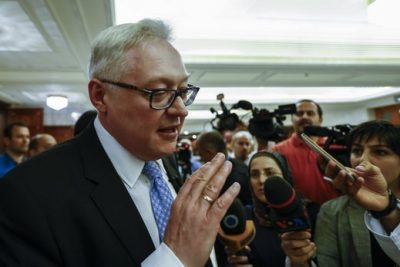Trump Seeking New START Deal Pre-Election?

Since taking office in January 2017, Trump has been a deal-breaker, not maker.
Hardliners surrounding him obstructed efforts to extend New START.
The last remaining Russia/US arms control agreement expires on February 5, 2021.
Unacceptable US demands on extending New START were made to be rejected, not accepted.
That’s where things now stand.
On Sunday, The Hill reported that Russian Security Council head Nikolai Patrushev and Trump regime national security advisor Robert O’Brien met in Geneva on October 2.
Claims of progress made toward extending New START were way overblown.
No agreement in principle was reached between both officials.
According to Russian Deputy Foreign Minister Sergey Ryabkov,
“there are still huge differences in approaches, including to the central elements of such an agreement.”
After frittering away nearly four years without extending New START, chances for resolving major differences between now and February 5 are slim at best.
If Biden defeats Trump and takes office on January 20, they’ll be scant time remaining to extend New START before its expiration date.
While extending it for another five years can be accomplished by agreement between the US and Russian presidents, nothing is ever simple in bilateral relations between both countries.
Without New START and the INF Treaty (the latter abandoned by the Trump regime on August 2, 2019 for phony reasons), nothing legally will stand in the way of unrestrained US expansion and deployment of its nuclear arsenal.
This action will force Russia and likely China to respond defensively, given a greater threat posed by Washington to their security.
According to Russian international security experts Andrey Pavlov and Anastasia Malygina, abandonment of New START “could create high levels of uncertainty and unpredictability.”
“A complete collapse of (stabilizing arms control) foundations, coupled with the deepening conflict between Russia and the West, could create a situation” fraught with dangers.
“Maintaining parity with the United States in strategic nuclear armament remains essential to Russian” security.
Moscow’s “longstanding definition of strategic stability (is) a situation in which no party has an incentive to initiate a nuclear first strike.”
If one super-power has a strategic advantage over another, there’s a heightened risk of potential conflict.
Russia is greatly concerned about US plans to deploy weapons in space, likely including nukes.
US political and military hardliners want nothing that deters their pursuit of a strategic advantage over all other nations, notably Russia and China.
If New START expires next year for failure of Washington to agree on extending it, a hugely dangerous arms race will likely follow.
Trump’s arms control envoy Marshall Billingslea falsely called New START “deeply flawed.”
It stood the test of time for nearly a decade.
So far, Russia’s chief arms control negotiator Sergey Ryabkov called Trump regime demands “absolutely unrealistic…a nonstarter for us.”
The US unacceptably combines demands and threats.
According to Billingslea, Washington “will be extremely happy to continue…without the START restrictions,” adding:
The US will begin expanding its nuclear arsenal straightaway.
He also threatened to impose new (unlawful) sanctions on Russia by the November election if its authorities don’t bend to the Trump regime on this issue.
Like countless times before, the US blames other countries for its own wrongdoing and failures to reach bilateral and multilateral agreements — along with phony reasons for abandoning existing ones.
On October 5, Ryabkov and Billingslea met in Helsinki, Finland.
In response to the Trump regime’s claim of significant progress from the meeting, Russia’s Foreign Ministry dismissed the claim, saying:
“(F)urther prospects on the track of bilateral cooperation on arms control” were discussed — no agreement reached.
Separately, Sergey Lavrov said based on where things stand now, New START “is going to die,” adding:
“The conditions (that the Trump regime) set are absolutely unilateral and do not take into account either our interests or the experience of many decades, when arms control was enforced to everyone’s satisfaction and was welcomed by all countries.”
Allowing New START to expire by the US will more greatly strain relations with Russia and China — along with increasing the threat of conflict between the US and these countries.
Washington upgraded but didn’t increase the size of its nuclear arsenal for decades.
Expanding it ahead if New START expires will be a major and hugely dangerous change in longstanding US policy.
Billingslea notably threatened to spend Russia and China “into oblivion” if a new arms race begins.
Arms control talks should focus on reducing numbers of nukes toward eliminating them altogether one day before they eliminate us.
*
Note to readers: please click the share buttons below. Forward this article to your email lists. Crosspost on your blog site, internet forums. etc.
Award-winning author Stephen Lendman lives in Chicago. He can be reached at [email protected]. He is a Research Associate of the Centre for Research on Globalization (CRG)
His new book as editor and contributor is titled “Flashpoint in Ukraine: US Drive for Hegemony Risks WW III.”
http://www.claritypress.com/LendmanIII.html
Visit his blog site at sjlendman.blogspot.com.

